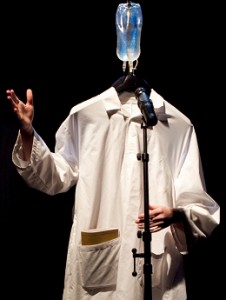the story of mr. wright
2b Theatre’s newest show, The Story of Mr. Wright, playing until October 28th at Neptune’s Scotiabank Studio Theatre, examines the stories that we tell ourselves and the power they have in constructing our reality.
2b’s Artistic Directors Christian Barry and Anthony Black bring us an ensemble of actors from Saskatchewan and together they interweave truths, one surrounding a medical miracle from the early 1950s and some surrounding their own stories of the power the mind has over the body. The story centers, as the title suggests, on “Mr. Wright”, a character from a real medical journal who was terminally ill with cancer of the lymph nodes, who had tumours the size of oranges, and was given a trial treatment of a drug known as Krebiozen and he experienced a dramatic (or arguably miraculous) recovery. What is even more fascinating than this miracle is the fact that Krebiozen did not have the same effect on others in the trail and the story of “Mr. Wright” seems to imply that the more he believed in the drug’s ability to cure him the more his body healed, yet when his faith relapsed the cancer returned. Can our minds have this sort of dramatic power over our bodies? Is it possible to believe ourselves out of what otherwise seems to be certain death?
The ensemble raise all these questions but do not attempt to answer them, instead they lead us to more questions and more doubt, which leads to more doubt and more questions. The five actors tell us stories that seem to come from their own lives and they offer us evidence of their truths. Many of these stories are heart wrenching. Judy Wensel seems on the brink of tears as she tells us about the multitude of pills she has tried to cure her migraines. Ashley Turner shows us a tattoo on her arm that says “Jordan” and tells a harrowing story about the power and fallibility of prayer. Yet, as the play draws to a close we begin to question how much truth there is to these stories and the legitimacy of the evidence we have been shown. How much are we willing to believe and how does that shape our relationship to this story and to Mr. Wright? What happens when a tiny seed of doubt is planted and how quickly can it spread to breed skepticism throughout? What happens to a play when its ability to be reliable is questioned? Can theatre ever bring us the absolute truth? Does such a thing even exist? Questions and doubt.
Anthony Black and Christian Barry have staged this play in a fascinating way. The actors frequently stand in a circle surrounding the innermost action, usually involving the hospital bed and Mr. Wright. It is sometimes difficult to see depending where the audience is seated in the Studio and some audience members sit on the stage itself, which further envelops the action. The actors speak to us as themselves, they introduce themselves, they make reference to the process of creating this work in combination with the Globe Theatre’s Young Company in Regina and 2b Theatre. This further roots us in the sense that we are being told the truth.
The story of Mr. Wright is told more fluidly, two actors, one male and one female, play “Mr. Wright” at different times, both using a microphone to give the chilling effect of his laboured breathing. At times outside theatrical forces are imposed on the characters, such as two who deliver their lines as though they want to sleep with one another, to create dramatic tension in scenes made up largely of exposition. These scenes are all highly meta-theatrical, which stands in stark contrast to the idea that this story of “Mr. Wright” is one taken from a factual medical journal. Indeed, as Barry and Black layer these truths it becomes clearer that the story we are being told is also a meticulously designed construction and we begin to question whether we have been led blindly to believe in a fabrication and what impact that has on the power of the story.
Can cancer be cured with the mind or do we just want to believe it to be so? What power does believing have on truth? And where did all of this leave Mr. Wright? You’ll have to go into the theatre and see what you believe for yourself.
The Story of Mr. Wright plays at Neptune Theatre’s Scotiabank Studio Theatre (1593 Argyle Street) in association with The Globe Theatre (Regina) and Eastern Front Theatre (Halifax) until October 28th, 2012. Shows are 8pm Friday-Sunday with a 2:00pm performance on Sunday, October 28th. Tickets are $15.00 (Student), $20.00 (Arts Worker), $25.00 (General) plus 15% HST. To purchase tickets please visit the Neptune Box Office at 1593 Argyle Street or call 902.429.7070 or go Online at http://tinyurl.com/8fuodxr. Also, if you are a “2b Newbie,” someone who has never seen a 2b Show before, or you bring a “2b Newbie” with you and you mention the words “2b Newbie” to the nice people at the box office, you (and your Newbie friend) will receive 20% off your ticket! It is a great deal. Bring a Newbie and Save! For more information please visit www.2btheatre.com.






 World Theatre Day: My God Is It Ever The Time to Invest in Canadian Plays
World Theatre Day: My God Is It Ever The Time to Invest in Canadian Plays 